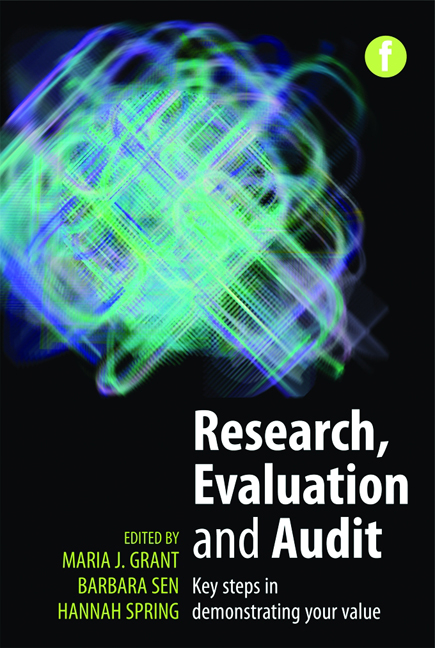Book contents
- Frontmatter
- Contents
- About the Editors
- Contributor
- Foreword
- Preface
- PART 1 GETTING STARTED
- PART 2 DOING RESEARCH, EVALUATION AND AUDIT
- 6 Reviewing the literature
- 7 Qualitative approaches
- 8 Quantitative approaches
- 9 Data analysis
- 10 Tools to facilitate your project
- PART 3 IMPACT OF RESEARCH, EVALUATION AND AUDIT
- Closing remarks
- Index
6 - Reviewing the literature
from PART 2 - DOING RESEARCH, EVALUATION AND AUDIT
Published online by Cambridge University Press: 08 June 2018
- Frontmatter
- Contents
- About the Editors
- Contributor
- Foreword
- Preface
- PART 1 GETTING STARTED
- PART 2 DOING RESEARCH, EVALUATION AND AUDIT
- 6 Reviewing the literature
- 7 Qualitative approaches
- 8 Quantitative approaches
- 9 Data analysis
- 10 Tools to facilitate your project
- PART 3 IMPACT OF RESEARCH, EVALUATION AND AUDIT
- Closing remarks
- Index
Summary
‘When might I need to do a literature review?’
‘Aren't all literature reviews the same?’
‘Why do a literature review?’
This chapter aims to provide you with the skills to conduct an effective literature review. It will provide a brief overview on the different types of review, the importance of the literature search within the research process and approaches to the analysis and synthesis of the literature.
In particular, this chapter assumes that you already know how to search the literature (see recommended further reading) and focuses on providing practical guidance on the skills and tools required to synthesize and critique the literature.
Role of the literature review
The role of the literature review to inform the research process is well documented (Grant and Booth, 2009; Hart, 1998; Jesson, Matheson and Lacey, 2011; Rowley and Slack, 2004). Defined as ‘a library deskmethod involving the secondary analysis of explicit knowledge, so abstract concepts of explicit, tacit knowledge are explored’ (Jesson, Matheson and Lacey, 2011, 9), the literature review helps to set your research, evaluation or audit in context and is an acknowledgement that you know what is happening within that context (Hall, n.d.a). Furthermore, the literature review can assist in supporting the development of a research proposal (see Chapter 4) in identifying potential research designs and the feasibility of adopting such approaches by assessing the strengths and weaknesses of the methodologies (see Chapters 7 and 8) adopted in previous studies. Examining the literature in this way will help to refine the research approach and aid in justifying the need for the research by identifying gaps within the literature.
Finally, when writing up your project (see Chapter 11) reference to the wider literature is required within the discussion of the project findings, setting your project findings in context with what has been done before. For example, you may want to state whether your findings confirm or contradict previous findings or contribute a new understanding or perspective to the subject. This can only be done with an awareness of the existing literature.
- Type
- Chapter
- Information
- Research, Evaluation and AuditKey steps in demonstrating your value, pp. 79 - 96Publisher: FacetPrint publication year: 2013



